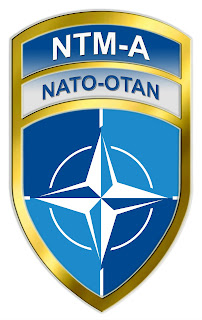Shadows
July '11: Never far from Afghan-looking rocks in Boulder
I mulled over this post's name for awhile, trying in vain to arrive at a title/theme that described in some way both Afghanistan's current state and my own. In the land that time forgot, the situation is ever-changing, while my post-deployment life is still stagnant in a professional sense. Working for peace and stability in Kabul was purposeful and in the national and international interest, but the idea of replicating that significance in anything stateside is something I find exceedingly difficult, to say the least. I stubbornly want to live in my (still recently) adopted home of Colorado, but haven't made progress towards reconciling those desires of what I personally consider satisfying employment and ideal environment. Perhaps the shadow of impact and interaction in Afghanistan does stalk me again, as it did for much of the time between 2006 and 2010.
Karzai's "surrogate father," Jan Mohammad Khan
In Afghanistan's power circles, it must be President Karzai and his senior allies sensing the shadows creeping closer. Closely following the assassination of his brother in Kandahar came the killing this week in Kabul of his longtime mentor and power broker in Uruzgan province, Jan Mohammad Khan. While the headline and premise of the story below may at least border on the sensational, it does seem that Karzai is becoming further isolated all the time...a trend that has tended to result in his reaching out to Pakistan and even "soft" Taliban with increasing frequency. You don't achieve lofty positions without making enemies, and in Afghanistan it is a particularly lethal wrath you often sow...for the cagiest, the name of the game is survival. As for its impact on the national psyche (and by extension, our goals there), I can't say it any better than my friend and former director Dave did:
Another old-timer killed. Conventional wisdom is that the Taliban will lay low until the completion of the American withdrawal. I disagree. The next 18 months will be far more violent than the last. Tighter rules of engagement will reduce American losses, meaning that the violence will be off most American's radar, but Afghan civilians, soldiers, and police will suffer greatly.
Afghanistan government under threat after second assassination in a week
LtCol Qahar addresses regional police PAOs in Balkh province
(Qahar is an old friend of mine from the Defense Ministry)
All over Afghanistan there still remain stories of progress among the security forces: new achievements and strengthening capabilities all the time. The great question, of course and as always, is how much time is needed...and how much we as a Coalition are willing to spare. I was pleased to read this week about a milestone in the north, which you can read about below. Particularly meaningful to me was the role of LtCol Abdul Qahar, in uniform in the photo above, since I recall the day he learned he was to be designated the new Public Affairs Officer for the Afghan National Army's 209th Corps, located in Mazar-e-Sharif. Wishing him, his soldiers, and the advisors/mentors who work with them daily, the very best as the transition train rolls on.
“We need to send one message to all Afghan people,” said Qahar, through an interpreter. “We need to show people our joint effort in the transition [of the country’s security to the ANSF].”
ANA hosts first northern public affairs conference
One aspect of our Afghan effort that never fails to amaze me is the quality of individuals we have in so many crucial roles. Attached below is a story that highlights the kind of extraordinary service member who exemplifies sacrifice and dedication. From a tenured position as a Long Island high school teacher to a Navy corpsman taking care of Marines in volatile Helmand province, Darryl St. George's story is one worth reading (for more, you can click on the 'Morning Edition' audio clip at the top of the web page). Jarheads find reasons every day to appreciate the "docs" in their midst who provide care...and St. George is clearly one who returns that appreciation for the trigger pullers.
"I couldn't think of being with a better group of guys than these Marines. They've got more heart than anybody I've ever met," he says.
NPR: A Teacher Leaves The Classroom For Afghanistan
On a lighter note, I enjoyed this item sent to me by a friend in Kabul, and thought it worth sharing. Some of these points I've covered before or at least touched on (particularly those referring to food and culture, of course -- and the only proper use of "Afghani"), but it's an interesting and informative look at some of the distinctions that many Afghans eagerly point out, should you have the opportunity to gain their friendship and conversation. Until next time, then...
BBC: Ten facts you may not know about Afghanistan




















